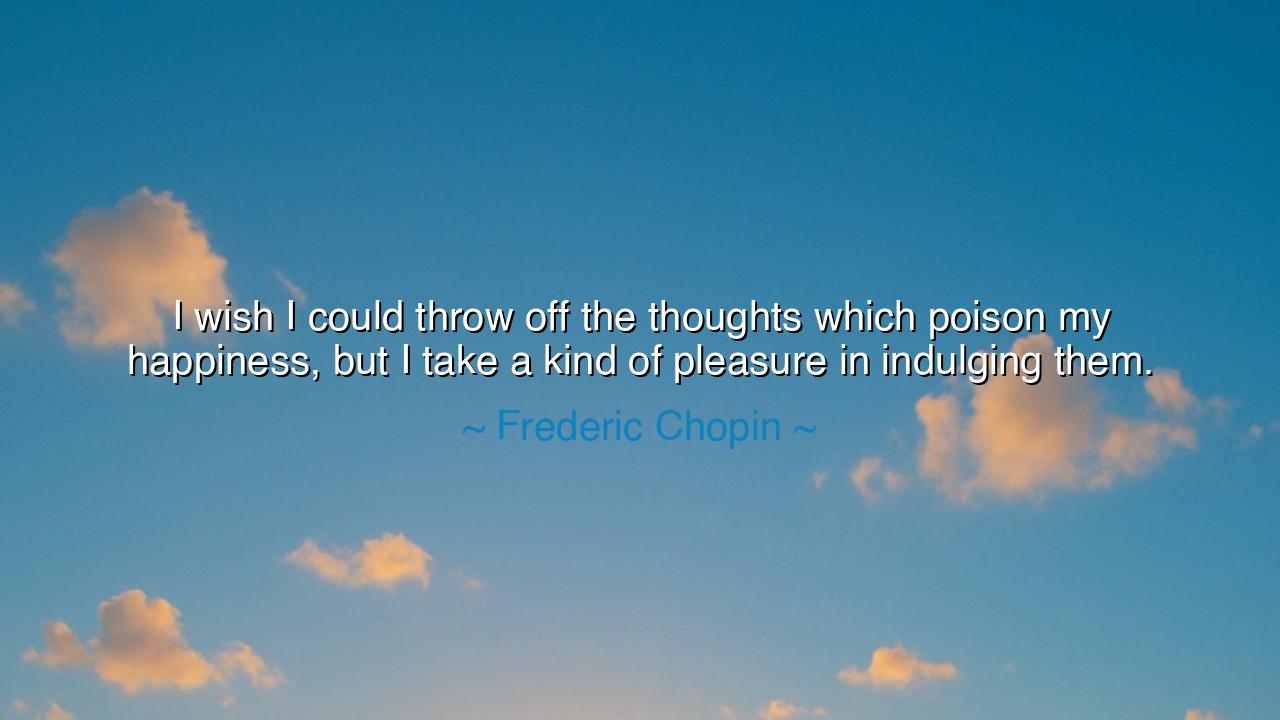
I wish I could throw off the thoughts which poison my happiness
I wish I could throw off the thoughts which poison my happiness, but I take a kind of pleasure in indulging them.






“I wish I could throw off the thoughts which poison my happiness, but I take a kind of pleasure in indulging them.” Thus spoke Frédéric Chopin, the poet of the piano, whose music still whispers through time like the sigh of a soul too fragile for this world. In these words, we hear the confession of a heart at war with itself—a mind longing for peace yet drawn irresistibly to its own sorrow. There is in this quote a paradox as old as humanity: that we sometimes cling to our pain, not because we desire suffering, but because suffering, when familiar, feels like home.
The meaning of Chopin’s words lies in the strange intimacy between pain and pleasure, between melancholy and beauty. He was a man of deep feeling, haunted by illness and exile, and yet his sadness gave birth to music of transcendent grace. In admitting that he “takes pleasure” in his dark thoughts, Chopin reveals a truth that many hide: that the human heart, in its complexity, often seeks comfort even in what wounds it. Our sorrows, if long enough cherished, become companions—painful, yes, but faithful, and in their constancy, they give shape to our inner life.
The origin of this sentiment lies in Chopin’s own existence, marked by frailty and yearning. Born in Poland but living most of his years in France, he carried within him the ache of displacement. His health was fragile, his love life tumultuous, his spirit sensitive to every tremor of joy or loss. His music—those nocturnes, those preludes—sings of this inner struggle. In each melody, one hears both the sweetness of memory and the sting of regret. To him, sorrow was not merely endured; it was transformed into art. In his confession, he acknowledges the dangerous seduction of sadness—the way it can become a kind of pleasure, even as it slowly erodes one’s happiness.
History offers us many who shared this duality. Consider Vincent van Gogh, who wrestled with torment and yet painted the stars with hope. His pain was deep, but in expressing it, he touched eternity. Like Chopin, he might have wished to escape his suffering, yet his very art drew its fire from that same anguish. There is in such souls a sacred contradiction: the wound becomes the wellspring. Their melancholy feeds their creation, and though it costs them peace, it gives the world beauty.
But this is not merely the story of artists—it is the story of all who have ever loved deeply, lost greatly, or dreamed beyond their reach. To indulge dark thoughts is to linger by the door of one’s pain, to trace its outlines and say, “This is part of me.” And perhaps, for a time, that is necessary. For to deny pain too swiftly is to deny the lesson it carries. Yet Chopin’s words are also a warning: that if we dwell too long in sorrow, the poison begins to take root, turning reflection into obsession, tenderness into despair.
The wise path, then, is not to cast sorrow aside, nor to drown in it, but to transform it. To feel deeply, as Chopin did, is a gift—but it must be tempered with self-compassion. When the dark thoughts come, acknowledge them, even listen to them, but do not make them your home. Use them instead as the soil from which new strength may grow. Let your pain teach you, but do not let it define you.
The lesson is thus: beauty can rise from suffering, but only if we learn to master it rather than be mastered by it. Do not fear your sadness, but do not worship it either. Like the great composer himself, take what wounds you and shape it into something luminous—into art, into understanding, into love. For even in the depths of sorrow, there lies a seed of creation, waiting for courage to set it free. And when that courage comes, the heart will find what Chopin longed for: not the denial of pain, but the harmony that comes from turning grief into music, and loneliness into light.






AAdministratorAdministrator
Welcome, honored guests. Please leave a comment, we will respond soon